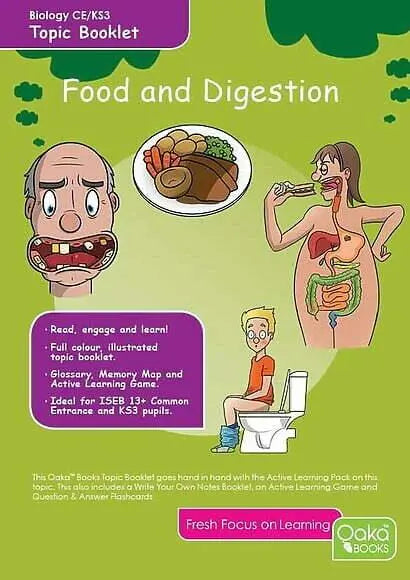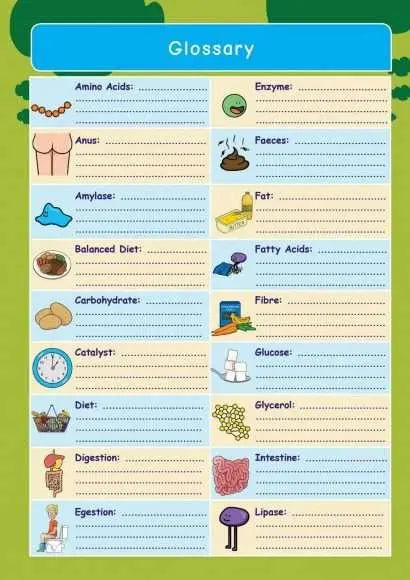

Common Entrance / KS3 Biology – Food & Digestion
✅ Learn or revise complicated concepts easily
✅ Information broken down into short chunks
✅ Full-colour illustrations on every page
Apart from being part of the curriculum, understanding food and nutrition is a life skill and essential for everyone. This Common Entrance & Key Stage 3 Topic pack covers the food and nutrition module of the syllabus in a very visual format, explaining the science of nutrition in a clear and easy-to-understand format, as well as explaining how to implement this in our daily diet. Using an active revision game and illustrations alongside the key points, this topic pack is ideal for revising this Common Entrance & Key Stage 3 biology topic.
One of the key features of our science topic packs is using the glossary of keywords and terms. This is a vital tool to ensure that pupils recognise and understand the keywords associated with each topic BEFORE they start learning about the specific topic. This way, they can focus on the processes rather than struggling with keywords, and learning will be both more effective and less stressful for them.
Topics Covered Include:
Glossary of key terms
What makes a balanced diet, and why is it essential for good health
Nutrients and why they are needed
Different food types
How we store energy from food
Carbohydrates: what they are, where they are found and why we need them
Proteins: what they are, where they are found and why we need them
Fats: what they are, where they are found and why we need them
Minerals and Vitamins: what they are, where they are found and why we need them
Fibre and water and why they are so important
Food tests for starch, glucose, sucrose, proteins and fats
The digestive process and the digestive system
Enzymes used in digestion
The importance of the small intestine and villi in the digestion
About Food & Digestion
A balanced diet includes various food types in the right proportions to provide all the necessary nutrients for good health. A balanced diet typically contains carbohydrates, proteins, fats, vitamins, minerals, and fibre.
Carbohydrates provide energy for the body, while proteins are essential for the growth and repair of tissues. Fats are important for maintaining healthy skin, hair, and nerves and also help absorb certain vitamins. Vitamins and minerals help the body function properly, while fibre helps regulate digestion and maintain healthy bowel function.
Different food types include:
Carbohydrates: bread, pasta, rice, fruits, and vegetables
Proteins: meat, poultry, fish, dairy products, eggs, and beans
Fats: oils, butter, and nuts
Vitamins: found in fruits, vegetables, and dairy products
Minerals: found in meat, poultry, fish, dairy products, and leafy green vegetables
Fibre: found in fruits, vegetables, whole grains, and legumes
Good health depends on a balanced diet, as a lack of essential nutrients can lead to various health problems, including weakness, fatigue, and a weakened immune system. On the other hand, consuming too much of certain types of foods, such as unhealthy fats or sugar, can also lead to health problems, such as obesity, heart disease, and type 2 diabetes.
The body stores energy from food through glycogen, which is stored in the liver and muscles. When energy is needed, the body breaks down the glycogen into glucose and releases it into the bloodstream. If the body needs more energy than is available from glycogen, it will break down fat stores to provide the necessary energy.
What's in each Topic Pack?
- Topic Booklet
- Write Your Own Notes Booklet
- Active Learning Q&A Flashcards








